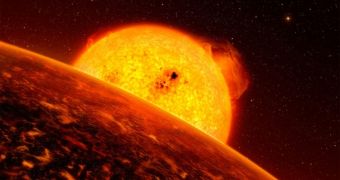According to the conclusions of a new scientific study, the entire Universe may have once been a giant incubator for life. Researchers from the Harvard University were able to determine that life may have been possible in the early Universe, at the time when the first stars formed.
Previous researches had suggested that even the most basic lifeforms could have not developed around young stars, due to a variety of reasons. Some of these include the massive size of these objects, the huge amounts of radiations they released, and so on.
But the new study, led by Harvard astrophysicist Abraham Loeb, argues that water may have appeared on extrasolar planets as early as 15 million years after the Big Bang, which suggests that the Universe has been habitable throughout its entire existence.
Loeb says that the heat and energy required to keep water from freezing over in the early Universe may have come from the cosmic microwave background (CMB), the ancient light left behind in the Cosmos by the Big Bang. The CMB is currently very dim, but it used to shine bright at one point.
Right now, the microwave background features very low temperatures, of just 2.7 Kelvin above absolute zero. However, when the Universe was just 15 million years old, the CMB heated everything that existed to 300 Kelvin (26.85 degrees Celsius or 80.33 degrees Fahrenheit).
According to the Harvard group, at that particular point in time, rocky exoplanets may have appeared in isolated pockets of space. The condition required for this to occur is a dense concentration of matter.
Some astrophysicists suggest that this was impossible at the time, due to the fact that not sufficient stellar cycles (births, deaths and rebirths) had occurred to see the Cosmos with elements heavier than hydrogen and helium. Loeb and his team show that planetary formation may have occurred in pockets of very dense matter.
As such, the Universe may have had a habitable epoch in its infancy, lasting anywhere from 2 to 3 million years. During this critical time, planets would have been able to support liquid water on their surface even if they were not inside their parent stars' habitable zones.
Details of this investigation have been submitted for publishing to the open-access journal arXiv, Nature reports.

 14 DAY TRIAL //
14 DAY TRIAL //